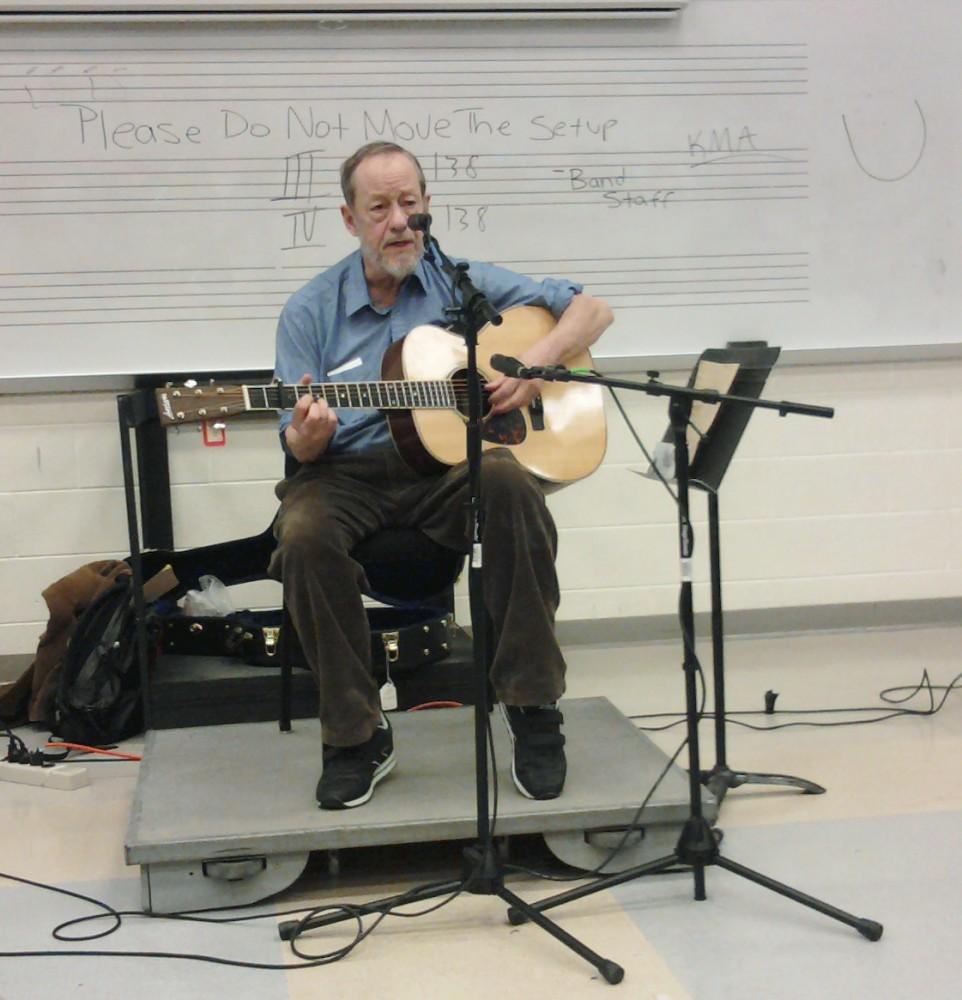Folk legend delights

Folk artist Joe Hickerson performed in the Guest Artist Series on Wednesday.
Apr 5, 2010
It was clear Joe Hickerson does not care about appearances. He ambled toward the mini-stage last week in well-worn chocolate brown corduroys and a cornflower blue button-up, with a black fanny pack hanging haphazardly from the back of his waist. His eyes were weighed down from many years of hard work, and his chin was dotted in grey stubble.
Before that, he had set up his own table of recordings for sale. There were only a few copies of many different CDs and cassettes, and when one CD sold prior to the show, he joked, “Better hurry up!” to the early birds glued to their seats in the front of the room.
Behind him, there was a chalkboard (after all, he was performing in a rehearsal room in the Performing Arts Center) with stray notes left on it from the day’s classes.
Then he applied some lip balm and began his sound check.
As he warmed up, he sang simply, accompanied by a few strums of his guitar, “Oh, Lord, I’ve got some singing to do, Oh, Lord, I’ve got some singing to do.”
After a few minor adjustments, Hickerson declared as he would many times through the night, “Good enough for road work!” and then took a seat in the front row, chatting with two audience members until his 8:30 p.m. start time.
Hickerson, a folk musician with a lengthy resume, returned to Grand Valley State University last Wednesday for his performance of “My 50 Years in Folk Music: Songs from the English-Speaking World” as part of the Guest Artist Series.
He has served as librarian and director of the Archive of Folk Song/Culture at the Library of Congress and has recorded from 1957 to 2003 on two different folk labels.
“At almost any moment, he can think of a song related to what we’re discussing,” said professor Lisa Feurzeig, and then tell the complete history behind it.
Hickerson knows who sang a song, what inspired it, how it was received and more, and he spoke for a few minutes before each song he played for his GVSU audience.
He loves folk culture and hopes it can “drive dull care away,” according to the song of the same name with which he begins his performances.
Most songs began with Hickerson showing the chorus to the audience first. Then he would sing the verses and the whole room joined together for the choruses. A common theme in his song choices was the railroad world.
He sang “The Dummy Line” about a train and incorporated Grand Rapids into a verse.
“As you will gather, this is a very slow train,” he said in the middle of the song to audience laughter.
His style incorporates a simple guitar melody with a combination of talking and singing, so it seems as if each audience member is having a one-on-one conversation with him. The room was replete with toe-tapping and wry smiles as Hickerson revealed what unexpected word would come next in each verse of each unique song he hand-picked to perform.
Before the first break, he asked the audience if they had any requests.
“Hard times!” shouted out one woman, and then Hickerson responded with, “Don’t we have enough?” to a jumble of crowd laughter.
Feurzeig, who coordinated the event, added, “Even some people who perhaps did not expect to be drawn into the performance found themselves joining in.”

























